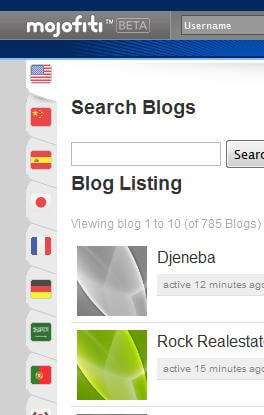A Global Social Network Without The Language Barrier – Mojofiti

Share
Mojofiti has a simple but awesome concept behind it: connect people together in a world without language barriers. The Mojofiti website, now in its second round of Beta testing, allows you to build a profile, make friends, form groups, and start a blog - your standard social networking tools. The twist is in a series of tabs on the left of the screen bearing the flags of different nations. Click on a flag and everything on the site is instantly translated into any one of 27 different languages. That blog post you just wrote, it's in French now. Or maybe you want to read your friend's profile in Korean. Easily done. The real innovation, of course, is not that you can arbitrarily translate your text into another language, but that you have access to thousands of other users without having to worry about their native language. I type in English, you type in Tagalog, our friend types in Farsi - it doesn't matter. We each read in our own native language as our content is translated automatically in real time. Mojofiti uses text translation to pry open social networking and fit the world inside.
Now, Mojofiti is really a compilation of different technologies all rolled into one. The website harnesses the power of Wordpress, Buddypress, and Google's machine dictionaries. Yep, let's make that very clear, Mojofiti uses Google text translations to power its site. That means that Mojofiti has all the same limitations (and capabilities) of the Google tool you've come to expect. Great speed, great range, but sometimes there's trouble with slang, idioms, subtlety, and precise intent. It's a good tool, I use it all the time, but Google translation does have its imperfections and you can expect them to carry over to Mojofiti. That being said, after exploring this new social network I never felt like I ran into any more problems with language than I would on any other site. The occasional sentence poorly translated into English was indistinguishable from how people write on the Internet anyway.
Mojofiti is the brainchild of Dennis Wakabayashi and Alan Simon. Along with the Beta social networking site, they run a translation service (Mojolingual) and a publishing platform (Mojosocial). Mojolingual doesn't use Google machine dictionaries, but rather relies on "several hundred translators" who are adept at using native colloquial terms in many different languages. It's clear that Simon and Wakabayashi believe that rigorous translation still requires humans. I agree, for now.
Be Part of the Future
Sign up to receive top stories about groundbreaking technologies and visionary thinkers from SingularityHub.


There's also a branch related to social service. The Mojofiti Foundation uses mojo-resources to help nonprofits and socially minded organizations to bridge language barriers to help the world. It's nice to see that Mojofiti realizes that with translation comes an increased opportunity to channel resources and talent where it's needed most around the globe.
With titans like Facebook, Google, and Twitter dominating social networking it's hard to be optimistic about the prospects of a fledgling social networking company. Reading the Mojofiti team's blog, I get the idea that these guys know the landscape fairly well, and they're making some good decisions. E-commerce is coming soon to the Mojofiti network, which will allow users to monetize their connections all over the world. That's a great selling point, but I don't think it's enough for Mojofiti to stand up alongside the big names in the business.
Especially because I suspect that Facebook, Twitter, and Google will all begin to incorporate text translation directly into their social networking programs very soon. Twitter already has third party developers that will translate your tweets. Google has their own translation machinery. It's probably much more likely that a giant social network will develop translation capabilities than a translation enabled network will grow into a giant. Either way, I think Mojofiti heralds a change in the way we connect to others online. Universal translators will break down language barriers and allow the world to communicate freely. Finally.
[image credit: Mojofiti]
Related Articles

Scientists Send Secure Quantum Keys Over 62 Miles of Fiber—Without Trusted Devices

Scientists Want to Give ChatGPT an Inner Monologue to Improve Its ‘Thinking’

Humanity’s Last Exam Stumps Top AI Models—and That’s a Good Thing
What we’re reading
